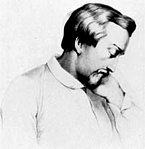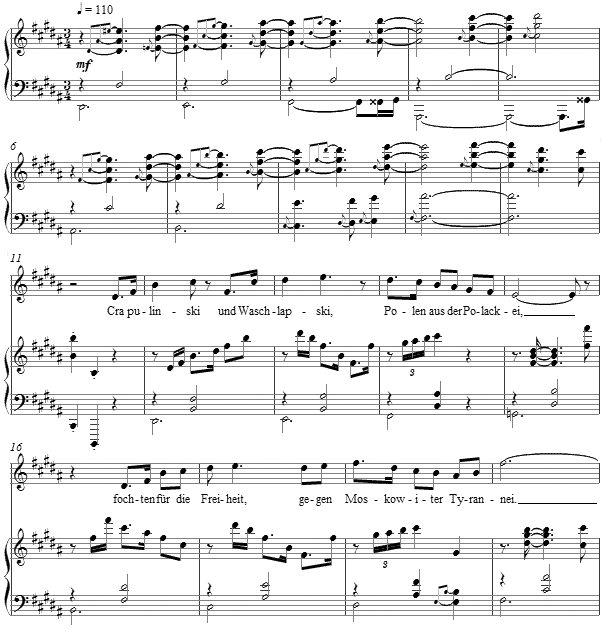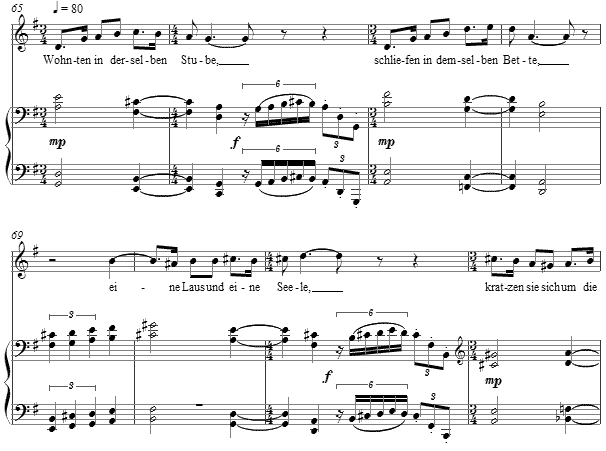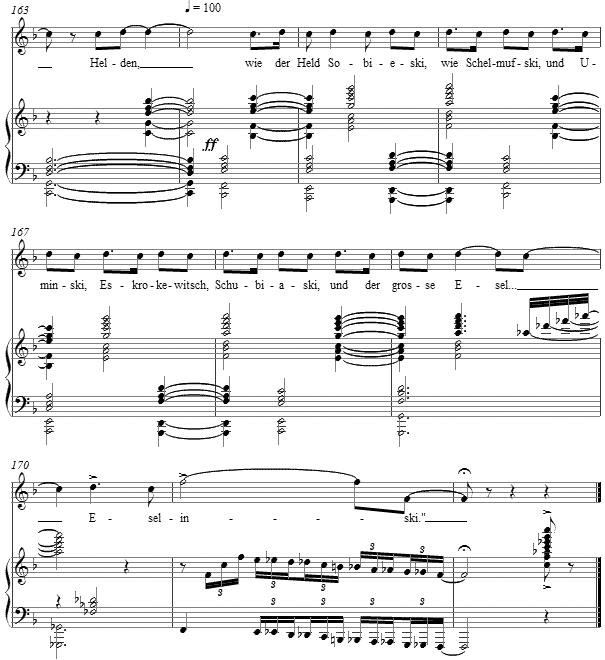Music and Texts of GARY BACHLUND Vocal Music | Piano | Organ | Chamber Music | Orchestral | Articles and Commentary | Poems and Stories | Miscellany | FAQs |
Zwei Ritter - (2004)
Heinrich Heine
for high voice and piano
Crapülinski und Waschlapski,
Polen aus der Polackei,
Fochten für die Freiheit, gegen
Moskowiter-Tyrannei.
Fochten tapfer und entkamen
Endlich glücklich nach Paris -
Leben bleiben, wie das Sterben
Für das Vaterland, ist süß.
Wie Achilles und Patroklus,
David und sein Jonathan,
Liebten sich die beiden Polen,
Küßten sich: »Kochan! Kochan!«
Keiner je verriet den andern,
Blieben Freunde, ehrlich, treu,
Ob sie gleich zwei edle Polen,
Polen aus der Polackei.
Wohnten in derselben Stube,
Schiefen in demselben Bette;
Eine Laus und eine Seele,
Kratzen sie sich um die Wette.
Speisten in derselben Kneipe,
Und da keiner wollte leiden,
Daß der andre für ihn zahle,
Zahlte keiner von den beiden.
Auch dieselbe Henriette
Wäscht für beide edle Polen;
Trällernd kommt sie jeden Monat,-
Um die Wäsche abzuholen.
Ja, sich haben wirklich Wäsche,
Jeder hat der Hemden zwei,
Ob sie gleich zwei edle Polen,
Polen aus der Polackei.
Sitzen heute am Kamine,
Wo die Flammen traulich flackern;
Draußen Nacht und Schnee gestöber
Und das Rollen von Fiakern.
Eine große Bowle Punsch,
(Es versteht sich, unverzückert,
Unversäuert, unverwässert)
Haben sie bereits geschlückert.
Und von Wehmut wird beschlichen
Ihr Gemüte; ihr Gesicht
Wird befeuchtet schon von Zähren,
Und der Crapülinski spricht:
»Hätt ich doch hier in Paris
Meinen Bärenpelz, den lieben
Schlafrock und die Katzfell-Nachtmütz,
Die im Vaterland geblieben!«
Ihm erwiderte Waschlapski:
»O du bist ein treuer Schlachzitz,
Denkest immer an der Heimat
Bärenpelz und Katzfell-Nachtmütz.
Polen ist noch nicht verloren,
Unsre Weiben, sie gebären,
Unsre Jungfraun tun dasselbe,
Werden Helden uns bescheren,
Helden, wie der Held Sobieski,
Wie Schelmufski und Uminski,
Eskrokewitsch, Schubiakski,
Und der große Eselinski.«
[ 10 pages, circa 6' 00" ]
Heinrich Heine
Heinrich Heine (1797-1856) tells us these two Polish heroes fought for freedom -- "...für die Freiheit"-- from the distant safety and relative comfort of Paris. The pretense of some politicians and diplomats who think themselves "Ritter" -- heroic knights -- pales when compared to the most seemingly ordinary of soldiers who fight for real freedom, and to whom we owe our freedoms today.
The poem says much of such self-congratulatory non-heroic "heroes." As the expression reproaches in the German, "Ritter ohne Furcht und Tadel" or in the French, "chevalier sans peur et sans reproche," Heine offers his own rebuke, his own reproach. In choosing to set this poem, I underscore Heine's wise yet comic poem and its editorial stance. Heine specifically suggests these two fictional "heroes" are not so much Poles, as Polacks in slang's derogatory sense, to separate them from Poland's real and true heroes as I read this poem. A free interpretation follows:
Crapülinski and Waschlapski, not Poles but "Polacks,"
Fight for freedom against Moscow's tyranny.
They fight courageously and escape eventually and "luckily" to Paris,
Staying to live, because to die for the Fatherland is sweet.
Like Achilles and Patroklus, David and his Jonathan,
These same Poles loved each other, with friendly kisses: »Kochan! Kochan!«
Neither annoyed the other, but stayed true and honest friends
For they were quite alike, these two -- not Poles but "Polacks."
They lived in the same parlor, and slept in the same bed;
A louse and a soul outdoing each the other.
Dining in the same pub, that neither would mourn,
each for the other would pay when no one would pay for them both.
Also the very same Henriette washed for these two proud Poles;
Warbling along, she came every month to collect the washing.
Oh yes, they had real washing, for each had two shirts,
because they were so alike, these two, not Poles but proud "Polacks."
They sat these days by hearths where flames flickered cozily,
while outside were night and snowstorms and the sounds of hackney cabs.
From a great bowl of punch (understandably un-sugared,unspoiled and undiluted) they have already quaffed.
A melancholy would creep into their souls;
their faces would moisten with tear drops, and Crapülinski spoke:
»If only I had here in Paris my bearskin, that dear sleeping jacketand the cat-fur night cap that remain in the fatherland!«
Waschlapski replied: »Oh, you are a true countryman,thinking always of our homeland, the bearskin and cat-fur night cap.
Poland is not yet lost. Our nation's wives who delivered,and our nation's children who do the same, will bless us with heroes,
Heroes like the hero Sobieski, like Schlemufski and Uminiski,
Eskrokewitsch, Schubiaski and the great Eselinski.«
The pun of the last name ("Esel" means donkey, but also a "stupid ass" or "idiot") suggests that heroes like these two are themselves "stupid asses." From the cozy comfort of their parlor, the nearest they come to the mortal dangers of war are the sounds of hackney carriages outside their window; even so, they wallow in their self-proclaimed love of the fatherland -- from afar.
The text is quite modern, for there are "hawks" who believe that war is all too often the answer to all geopolitical problems, and there are equally the many public antiwar "doves" for whom protest against war is carried out in public ways in peaceful societies but whose human rights protestors never travel to totalitarian states to protest out of the obvious awareness that to demonstrate against a Western soldier is safe but to protest against a totalitarian regime in that regime's national borders is to risk both life and limb. I am amused that so many Westerners proudly display the banner, "War is not the answer," but who rarely propose a real and effective answer of their own. Of such doves and hawks in this time Heine has written from his time.
As one sees regional and world conflicts break out, those who would do "battle" with civilized nations so easily show their fecklessness by not having done equal battle with the uncivilized. One only need think back to the Viet Nam war's era in which antiwar activists filled the streets of the civilized world, and then, during the holocaust of Cambodia, were almost wholly absent silent as millions died. This dishonest and discontinuous "fight for freedom" is not a current phenomenon, but rather one which Heine too recognized so long ago.
Heinrich Heine, a German poet of Jewish origin, was born in Düsseldorf in 1797 and died in Paris in 1856. He studied at Bonn, Berlin and Göttingen universities, but his calling was for literature rather than law, although he eventually earned his degree in 1825. Heine, like his teacher Hegel, was passionate about Napoleon, such that he converted to Protestantism to make possible a civil service career -- at that time closed to Jews. Heine first published Gedichte in 1821, followed then by Buch der Lieder which were some of his loveliest lyrics. His early work was influenced by folk poetry, but his mocking tone of them sets them aside from the romantic mainstream. The four-volume Reisebilder of 1826-31 were the product of summer vacations -- a combination of autobiography, literary debate and social criticism.
In 1827 Heine visited England, but middle-class materialism disturbed him and he returned disillusioned to Germany. In the third volume of Reisebilder (Die Bäder von Lucca), Heine ridiculed the poet August von Platen, who had attacked him on his Jewish origins. This damaged Heine's reputation, and in 1831 he went to Paris as a journalist, to write newspaper articles about developing democracy and capitalism in France. His reports on French cultural and political affairs, his travel books and works on German literature and philosophy, his critical views annoyed the German censors. At the end of 1835 the German government tried to enforce a nationwide ban on his writings. His voluntary exile became a forced one. In defiance of censors in Germany he visited his home country and published a long verse satire, Deutschland: a Winter's Tale (1844). Near the end of the poem, the patron goddess of Hamburg, reveals a vision of Germany's future to the poet-narrator in a chamber pot. In the same year the Silesian weavers protested violently against intolerable working conditions and Heine sided with them in his poem:
Doomed be the fatherland, false name,
Where nothing thrives but disgrace and shame,
Where flowers are crushed before they unfold,
Where the worm is quickened by rot and mold - We weave, we weave.
Friedrich Engels translated the poem into English, which later guaranteed that the poet became one of the most studied in Communist countries. Karl Marx also read Heine's poems and corresponded with him. Given that this poem speaks of what today Islamic fanatics -- successors to those dreamers of international conquest by the fascist and Marxist states -- think of as the weakness of the West, the association of Heine with the early socialists and their notions of class warfare and dictatorship is at this point ironic. A modern Germany is now dealing with the daunting fiscal burdens of trying to finance the modern social welfare state, which may well yet again "doom" the "fatherland." Today's German unions speak of working a few additional hours per week as "intolerable," a dramatic shift in the meaning of that word within the history of labor relations from the time of the Silesian weavers' protests to the modern protests.
During his final years Heine was interested in combining elements of Christianity and pagan sensualism. His last romantic affair was with Austrian Camilla Selden, whom he nicknamed 'Mouche'. His poems for her are among his best love lyrics. Long after his death in 1856, his work still created controversy in Germany, and the Nazis, because of Heine's Jewish background, insisted that the poet's songs should be marked 'author unknown' in poetry collections.
This setting of Zwei Ritter opens with a gesture of odd pride, as these two "Polacks" place themselves among the great heroes of Poland, from their comfortable and safe lodgings in Paris. From that vantage point, as with so many today when "human shields" worried about coalition "atrocities" in Iraq after decades of ignoring Baathist atrocities in that same country, or all those who so publicly called for military action in Kosovo while ignoring the much greater genocide of Rwanda in that time. Each modern "great Eselinski" is not so different from those heroes of which Heine wrote.
As the setting progresses, successive key changes occur shifting from region to region elusively. With each new revelation about the two heroes, additional musical gestures underscore these characteristics. Here below, a quasi-recitative describes the manner in which the warriors so comfortably and safely live.
As the setting draws to a close, the proud list of imaginary heroes like unto these two "Ritter" is accompanied by a rhapsodic underscoring, alternating high and low ranges in the piano, and all cluttering to a chromatic close and final eighth note chord of a meek F minor squeak.
The score to Zwei Ritter is available as a free PDF download, though any major commercial performance or recording of the work is prohibited without prior arrangement with the composer. Click on the graphic below for this piano-vocal score.



